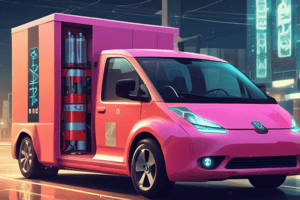Podcast
Questions and Answers
Which of the following companies is not traditionally known for manufacturing electric vehicles?
Which of the following companies is not traditionally known for manufacturing electric vehicles?
- Chevrolet
- Ford (correct)
- Tesla
- Nissan
What is a major factor influencing the growth of electric vehicle sales in the coming decades?
What is a major factor influencing the growth of electric vehicle sales in the coming decades?
- Decrease in traditional vehicle manufacturing
- Increasing fuel prices
- Advancements in battery technology (correct)
- New government regulations on gasoline cars
What must be considered when evaluating the total environmental impact of electric vehicles?
What must be considered when evaluating the total environmental impact of electric vehicles?
- Benefits of hybrid vehicles
- Only emissions fromTransportation during vehicle use
- Emissions from manufacturing and electricity generation (correct)
- Cost of electric vehicle production
Why is the development of battery recycling technologies considered critical?
Why is the development of battery recycling technologies considered critical?
What represents a significant shift in transportation technology that includes advantages such as environmental benefits?
What represents a significant shift in transportation technology that includes advantages such as environmental benefits?
What is a significant characteristic of Battery Electric Vehicles (BEVs)?
What is a significant characteristic of Battery Electric Vehicles (BEVs)?
Which type of electric vehicle is capable of charging via a plug?
Which type of electric vehicle is capable of charging via a plug?
What is one of the main advantages of electric vehicles?
What is one of the main advantages of electric vehicles?
What is a common disadvantage of electric vehicles?
What is a common disadvantage of electric vehicles?
Which component stores energy in an electric vehicle?
Which component stores energy in an electric vehicle?
How do Hybrid Electric Vehicles (HEVs) recharge their batteries?
How do Hybrid Electric Vehicles (HEVs) recharge their batteries?
Which statement reflects a market trend in the electric vehicle industry?
Which statement reflects a market trend in the electric vehicle industry?
What is true about the charging times of electric vehicles?
What is true about the charging times of electric vehicles?
Flashcards are hidden until you start studying
Study Notes
Overview of Electric Vehicles (EVs)
- Definition: Electric vehicles (EVs) are cars that are powered by electricity instead of traditional gasoline or diesel fuel.
- Types of EVs:
- Battery Electric Vehicles (BEVs): Fully electric, run on battery power only.
- Plug-in Hybrid Electric Vehicles (PHEVs): Combine an electric motor and a gasoline engine; can be charged via a plug.
- Hybrid Electric Vehicles (HEVs): Combine a conventional engine with an electric motor; not plug-in and recharge through regenerative braking.
Key Components
- Electric Motor: Drives the vehicle; can be AC (Alternating Current) or DC (Direct Current).
- Battery Pack: Stores energy; typically lithium-ion batteries, which provide high energy density.
- Charging System: Allows vehicles to recharge batteries; includes Level 1 (standard outlet), Level 2 (home charging stations), and DC fast charging.
Advantages of EVs
- Environmental Impact: Lower greenhouse gas emissions compared to traditional vehicles, especially when charged from renewable energy sources.
- Fuel Cost Savings: Generally lower cost per mile compared to gasoline or diesel.
- Maintenance Costs: Fewer moving parts result in lower maintenance requirements and costs.
- Government Incentives: Many regions offer tax credits, rebates, or other incentives for EV purchases.
Disadvantages of EVs
- Range Anxiety: Limited driving range compared to gas vehicles can be a concern for some users.
- Charging Infrastructure: Availability of charging stations may be limited in some areas.
- Charging Time: Charging can take longer than refueling a gas vehicle.
- Initial Cost: Higher upfront cost compared to traditional vehicles, although prices are decreasing.
Market Trends
- Growth Rate: Rapid increase in EV adoption globally, driven by technological advancements and regulatory support.
- Major Players: Tesla, Nissan, Chevrolet, BMW, and emerging manufacturers like Rivian and Lucid Motors.
- Future Predictions: Expected to make up a significant portion of new vehicle sales in the coming decades, influenced by advancements in battery technology and charging networks.
Environmental Considerations
- Lifecycle Emissions: Must consider emissions from manufacturing and electricity generation when evaluating total environmental impact.
- Battery Recycling: Development of recycling technologies is critical as EV adoption increases to minimize waste and resource depletion.
Conclusion
- Electric vehicles represent a significant shift in transportation technology, with growing popularity due to environmental benefits, economic incentives, and advancements in technology. Understanding their components, advantages, and challenges is essential for navigating the future of mobility.
Overview of Electric Vehicles (EVs)
- Electric vehicles operate solely on electricity, eliminating the reliance on gasoline or diesel.
- Types include Battery Electric Vehicles (BEVs), which use only battery power, Plug-in Hybrid Electric Vehicles (PHEVs), which combine electric and gasoline propulsion, and Hybrid Electric Vehicles (HEVs), which regenerate power without plugging in.
Key Components
- Electric motors can utilize either AC (Alternating Current) or DC (Direct Current) to propel the vehicle.
- Battery packs are mostly made from lithium-ion technology, offering a high energy density essential for vehicle operation.
- Charging systems facilitate battery replenishment through various levels, including Level 1 (standard outlets), Level 2 (home charging), and DC fast charging.
Advantages of EVs
- EVs produce lower greenhouse gas emissions, particularly advantageous when powered by renewable energy sources.
- Economically, operating costs per mile for EVs are generally lower than those for conventional vehicles.
- Maintenance is easier with fewer moving parts, resulting in reduced service and repair expenses.
- Many government programs provide incentives such as tax credits or rebates to encourage EV adoption.
Disadvantages of EVs
- Range anxiety poses a challenge, as many users worry about the limited distance EVs can travel on a single charge.
- A lack of widespread charging infrastructure can hinder the practicality of using EVs in certain regions.
- The time required to charge an EV typically exceeds that needed to refuel a traditional combustion engine vehicle.
- Although decreasing, the initial purchase price of EVs remains higher than that of comparable gasoline vehicles.
Market Trends
- Global EV adoption is experiencing significant growth, fueled by technological improvements and supportive regulations.
- Major manufacturers in the EV market include Tesla, Nissan, Chevrolet, and BMW, alongside new entrants like Rivian and Lucid Motors.
- Predictions indicate that EVs will comprise a substantial share of new vehicle sales in the future, driven by enhanced battery technology and expanded charging networks.
Environmental Considerations
- Evaluating EVs requires considering lifecycle emissions, including those from production processes and the sources of electricity used for charging.
- As EV usage increases, advancements in battery recycling technologies will be crucial for reducing waste and preserving resources.
Conclusion
- Electric vehicles are transforming transportation, with rising popularity linked to environmental advantages, financial incentives, and technological innovations. Understanding their features and challenges is vital for future mobility trends.
Studying That Suits You
Use AI to generate personalized quizzes and flashcards to suit your learning preferences.





